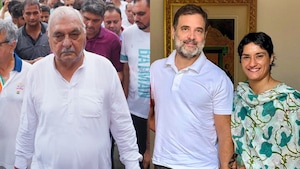By Ravi Singh
In my late twenties, I faced burnout while working 40 hours a week. Surprisingly, my subsequent job demanded over 70 hours weekly, yet I found myself energized and eager to start each day. Henry David Thoreau famously said, “It is not enough to be busy; so are the ants. The question is: What are we busy about?” If the work lacks personal interest or meaning, even two hours a day can feel excruciating. This is a key reason why many find the hustle culture to be superfluous and unfulfilling.
Companies like Microsoft and Tesla arose because their founders didn’t watch the clock, choosing instead to focus relentlessly on their work without breaks, even on weekends. It was their passion that drove them. But people like Bill Gates and Elon Musk are the exceptions rather than the norm. They are the lucky few who find alignment between their passion and their work.

Turned 40? Don’t further delay investing in stocks

Mutual Fund Investment: 10 strategies to boost your mutual fund returns

What’s helping BSNL is a worry for private telcos- Tarriff hike leads to subscriber losses for Jio, Vodafone and Airtel

Haryana Election 2024: Full list of Congress Candidates and Constituencies
Millennials and Gen Z are more outspoken about their work preferences compared to previous generations. This shift is driven by the wealth of options available in today’s economy and the financial security provided by their parents. Additionally, employers are becoming more adaptable to employee needs, offering perks like stylish workspaces and the flexibility to work from home. Against this backdrop the recent discussion around the 70-hour work week has become even more polarised.
Professionals, particularly those aged 25 to 35, are increasingly considering to move away from traditional corporate roles due to burnout and the desire for a different lifestyle. Many are considering entrepreneurship or alternative lifestyles such as travel vlogging, social media influencing or remote work from scenic locations, often coupled with activities like intensive yoga retreats. Amidst the FOMO of having the ideal work-life balance we must understand how we humans operate at the very fundamental level.
We operate in two modes: the fast, “doing” mode of productivity and multitasking, and the slow, “being” mode associated with relaxation and activities like spending time with loved ones. The doing mode, while inevitable, often leads to stress and exhaustion, while the being mode, with its lack of productivity focus, is rejuvenating. Both the modes are equally important. This is such a fundamental feature of the human condition that we find discussions about it in our ancient texts.
Valmiki’s epic works, the Ramayana and the Yoga Vasistha, offer guidance on this dual aspect of life: doing and being. The Ramayana illustrates the importance of righteous action, underscoring the actions one must take in life. On the other hand, the Yoga Vasistha delves into the philosophical aspects, guiding individuals on how to ‘be’. It explores the inner workings of the mind and the nature of reality, encouraging a deeper understanding of existence and self-awareness.
These dual aspects of life can pull us in two opposite directions. This brings us to the significance of spirituality, a term so frequently used today that its true meaning often becomes obscured. One of the key aspects of spirituality is that it connects the diverse aspects of our minds, each pulling away in its own direction. Typically, when we are immersed in doing mode, our serene, quieter side seems almost like a separate identity. Most people struggle to find harmony between the two modes.
When you take a vacation to the mountains after months of hard work, you gradually shift from a state of doing to a state of being over a few days. You relish this mode for a while, and it may even tempt you to consider staying there permanently. However, after some time, most people grow restless with the being mode. They return to the doing mode because it allows them to make a difference in the world. This drive to have an impact is a deep-seated human instinct. Yet, after working for a while, burnout sets in, and the desire to return to the being mode resurfaces. This cycle of oscillating between the two modes often leads to questioning what you truly want from life.
Spirituality serves as a bridge between these varied mental and emotional states. A highly spiritual person remains conscious and present whether they are pushing hard or resting. It is as though they have tapped into a central network or energy source that powers both our doing and being modes. This awareness helps us realize the interconnectedness of all our mental states, bringing a sense of lightness and shared energy across all modes of being.
The harmony between seemingly opposite states is a recurring theme in ancient philosophical thought. The Yin and Yang symbol, a circle divided into swirling black and white sections, each containing a dot of the opposite colour, embodies this idea. It illustrates the interconnectedness and interdependence of seemingly contrary forces within the natural world. Similarly, according to Bhagavad Gita one must act while remaining detached from the outcomes of those actions, uniting the contradictory impulses of action (doing) and renunciation (being).
Many people find this harmony through yoga or meditation, while others may discover it through religious practices. Some achieve it by traveling, dancing or even by engaging in extensive work weeks of 70 hours. Each person is unique in their constitution and interacts with the world in their own distinct way.
Thus, when we compare the external pressures of a demanding 70-hour workweek with a more relaxed lifestyle, it is important to recognize that these scenarios reflect the two primary mental states: doing and being. The key to balance lies in achieving internal harmony between these modes. Spiritual practices can help not only in unifying these states but also in aligning our emotions, thoughts, and overall mental well-being, enabling us to manage life more effectively and realize our true selves.
The writer is an author and an IRS officer.
Disclaimer: Views expressed are personal and do not reflect the official position or policy of FinancialExpress.com Reproducing this content without permission is prohibited.





